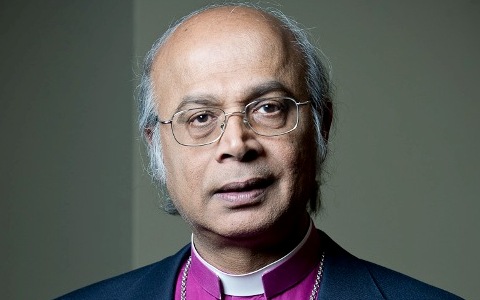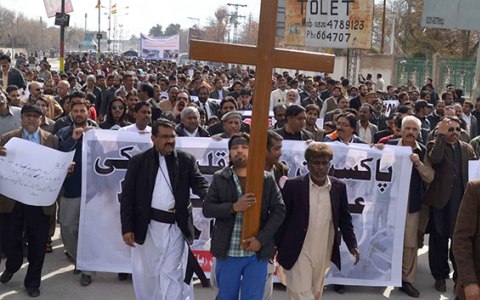Calls for action over Pakistan church bombings
by - 20th March 2015

BISHOP Michael Nazir-Ali has criticised Western nations for ignoring the persecution of Christians around the world in the wake of Sunday’s deadly church bombings in Pakistan.
Pakistani-born Dr Nazir-Ali, the former Bishop of Rochester, said: 'There are so many places in the world where Christians are targeted, if it was any other group, there would be furore in the West. Instead, Western countries are embarrassed to side with Christians for fear of being seen as partisan.'
The bishop was speaking in reference to suicide bombings targeting two churches in Lahore which left 17 worshippers dead. A faction of the Pakistani Taleban claimed responsibility for the attack.
He also criticised the lack of media coverage surrounding the plight of Christians in Muslim countries.
‘When the Yazidis were under attack in Iraq, there was uproar. Christians have been under sustained attack in Pakistan for fourty years and there’s barely any coverage,’ he said.
His comments echoed those of Pope Francis, who condemned the bombings and accused the world of 'seeking to hide' the persecution of Christians.
Appeasement
Dr Nazir-Ali also urged the Pakistani government to ditch its policy of appeasing extremist groups and called on it to instead 'act decisively' against them.
He said: 'Pakistan needs to get committed to eliminating this kind of extremism. But it has one hand tied behind its back with its policy of 'good' and 'bad' extremists. The Taleban has been tolerated because of the strange doctrine of keeping militants happy for strategic purposes, mainly to use against India.'
Dr Nazir Ali believes that this has contributed to the types of attacks witnessed on Sunday.
Mustafa Qadri, researcher at Amnesty International and a Pakistan expert, said: ‘There appears to be a very selective approach to targeting armed groups. The chronic failure to bring those responsible for these attacks to justice has enabled them to continue with impunity. The government should direct its intelligence resources to prevent attacks and to work with law enforcement and the justice system to bring the perpetrators to justice.’
Need for protection

Christians make up about two percent of Pakistan's 180 million population and the church attacks are the most deadly against the community since 2013, when 82 people were killed in a suicide bombing in the northwestern city of Peshawar.
In recent years, increasing numbers of Christians have been charged with allegations of blasphemy relating to the Quran or the Prophet Mohammed, often on flimsy evidence.
There have been calls for blasphemy laws to be abolished, and last year they were condemned by the European parliament which said that they were increasingly being used to target vulnerable minority groups.
Dr Nazir-Ali added: 'Along with attacks on minorities such as Shias and Ahmadiyyas, Christians have been targeted a number of times. There's now a campaign against soft targets, like this one, so there's an immediate need for protection at minority places of worship and schools. The extremists want a Salafi/Wahabi state where there's no room for anyone else.'
Culture of intolerance
UK charity Release believes there is a 'culture of intolerance' embedded into Pakistani society.
Its chief executive Paul Robinson said: ‘There is a growing culture of intolerance in Pakistan which has led to these attacks. The authorities must redouble their efforts to change this hostile religious climate.’
Qadri points to the Pakistani legal and education systems as being part of the problem.
‘It’s a challenge to mobilise society to demand justice for the victims because laws encourage the role of minorities as second class citizens and the state curriculum itself is discriminatory against minorities. All this creates a toxic environment,' he said.
The West
Some experts argue that by backing Gulf regimes that promote an extreme brand of Islam, Western governments are contributing to the problem.
Anwar Akhtar, director of the Samosa and RSA Pakistan Calling, which promote greater understanding between Pakistan and the UK, said: 'At heart, the attacks are to do with sectarian hatred in South Asia, but the West has also made things worse by aligning itself to Gulf states that are openly promoting a hateful ideology into Pakistan.'
Dr Nazir Ali said that Christians are often targeted because of the mistaken assumption that they have some association with the West: 'To some extent they are bearing the brunt of what the West is perceived to be doing in the Muslim world'.
Hope
Akhtar praised the work of individuals within Pakistan's state machinery for attempting to do more, but acknowledged the risks involved.
He said: 'There are elements in the government that are trying to do more, but as we saw with the case of Salman Taseer, they realise they are putting themselves at great risk by speaking out.’
When Salman Taseer, former governor of Pakistani Punjab, spoke up publicly against the blasphemy law and in support of minority groups, he was gunned down by his bodyguard.
For its part, the Pakistani government has ordered the military to ramp up its offensive against militants since Taleban gunmen massacred more than 150 at a school in Peshawar in December.
However, Akhtar warned that extremism may be 'out of control' and called for ‘stronger leadership from government, faith groups and from all sections of Pakistani society’.
